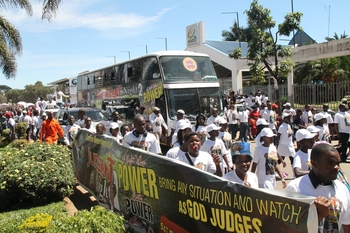Why ICC won’t dump ZC

Robson Sharuko Senior Sports Editor
ZIMBABWE Cricket might be a stricken ship,weighed down by a crippling debt fuelled by mounting costs and depressed income, but its status as a Full Member of the ICC isn’t under immediate threat.
And it’s very unlikely, too, that ZC will be dumped by their international mother body.
Domestic cricket has been relying on a raft of bank loans and ICC bailouts to sustain itself in an increasingly hostile environment where rising costs of running the game are not being matched by dwindling income that is being generated by the sport.
Without the receipts guaranteed by hosting Test tours involving England and Australia, for political reasons for the last couple of years, the ZC financial base has been squeezed and its capacity to underwrite its expenses has been undermined with each passing year.
ZC expects to generate US$34.5 million, according to the ICC, within the next three years but the organisation is already stuck in debt and while that chunk looks like a huge figure, in terms of income, it’s unlikely to make a huge difference in terms of nursing the organisation back to good financial health.
But what does this mean for the future of cricket in this country and are concerns, within sections of the game, that our status as a Full Member of the ICC is under threat and, if ZC nose dive into insolvency, it could be expelled from the elite club of the game’s powers, backed by any substance?
A confidential ICC report, authored by ICC chief executive David Richardson and chief financial officer Faisal Hasnain, which deals with the tough task of trying to balance the ZC books and keep the organisation functional, has been obtained by The Herald and gives an insight into the past, the present and possible future of a game that has transformed itself into the second biggest sporting franchise in the country.
The report recommends severe cost-cutting measures to make the ZC leaner to reduce the cost of running the organisation, including reducing the number of franchises from five to four, the number of contracted players on each franchise to 14 and only 15 players to be given national contracts.
The report also recommended that Zimbabwe national cricketers also have a mindset shift, in terms of their expectations with regards remuneration, taking into account the difficult economic environment prevailing in this country and ZC’s weak financial position.
“The players need to better understand the harsh realities of the state of the Zimbabwe economy and the current financial position of ZC,” the confidential report says.
“ZC has agreed to reduce the number of contracted players from 99 to 56 (i.e 14 per franchise). This will include 15 nationally contracted players. Only the 15 nationally contracted players would be on 12 months contracts. The rest would only play during the cricket season.”
But why should the ICC continue nursing ZC? For how long can the ICC continue bailing out ZC? What are the repercussions in the event that ZC plunge into insolvency? Can ZC be expelled and its special status as a Full Member of the ICC revoked?
“Before agreeing to lend ZC a further US$10.8m (and increasing the ICC’s loan exposure to US$18.6M), the F&CA and the Board may wish to debate the broader principles at play, including whether it is the role of the ICC to go to such significant lengths to protect the solvency of a Full Member of the ICC,” the report says.
“Other Members, particularly other non-Full Members who have traded solvently and made significant ‘on-field’ progress (e.g Afghanistan, Ireland) may well raise valid concerns about the value of exposing the ICC to such risks to protect a Full Member whose current performances on the field are no better than a top Associate Member.
“It is also questionable whether ZC actually fulfils the requirements that another Associate Member would need to meet if it applied for Full Member status of the ICC. The question has to be asked whether ZC is able to sustain itself as a Full Member.
“For the record, the following paragraphs set out the potential consequences of potential insolvency situation in respect of ZC:
(a) First, there is no express power to expel a Member in the event of insolvency.
(b) However, ZC could be suspended (and subsequently expelled at the next Full Council meeting) as a Full Member of the ICC in circumstances where it ‘lose(s) its status as the governing body responsible for the administration, management and development of cricket in the country.’ Presumably, this would be the case in the event of an insolvency situation which led to the winding of ZC.
(c) However, in the event that ZC is put into administration/receivership (instead of being wound up) and a rescue plan was put in place that enabled it to trade its way out of difficulty, unless the above criteria (or other less relevant criteria) were met, there would be no express power to suspend and expel from Membership.
(d) In the event of a winding up of ZC, any new governing body assuming responsibility for cricket in Zimbabwe, may then be entitled to apply for membership (including Full Membership) of the ICC. There are certain procedural requirements in the ICC’s constitution as to the need for a proposer and seconder in respect of an application for Full Membership, and in respect of timing of any such application. In determining how to manage that situation, the ICC ought to have due regard to the manner in which similar circumstances were dealt with (as in the case of Cricket Kenya).
(e) In addition, there are more detailed guideline criteria for Full Membership of ICC, which provide guidance as to certain standards to be met in the following areas — playing, development, grounds and facilities, financial, standing of cricket in society, media and other relevant information. However, there is no mechanism/authority to check whether ZC(or indeed any other Full Member) are currently compliant with this criteria.
(f) In determining whether to admit any new Full member, to avoid any potential legal challenge, consideration must be given to the manner in which previous applications for Full Membership made by other governing bodies had been treated, e.g Bangladesh, Kenya, Ireland and Zimbabwe itself.
(g) Other issues of relevance that would need to be considered in more detail (though not necessarily by the ICC) include: (a) what insolvency law provides in Zimbabwe in respect of directors’ duties and obligations and the ability (or otherwise) for the same individuals to incorporate or be involved in new companies with the same objectives; and (b) what government interventions there would be in the event of ZC’s insolvency.”









Comments